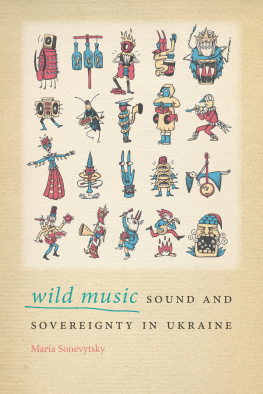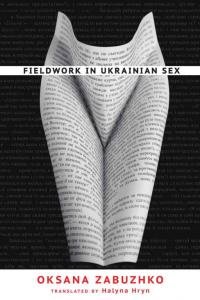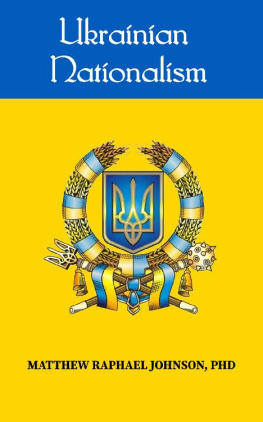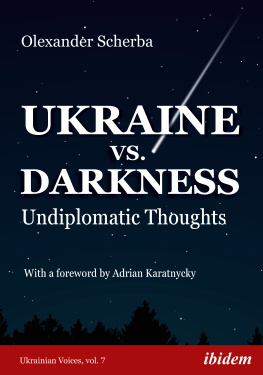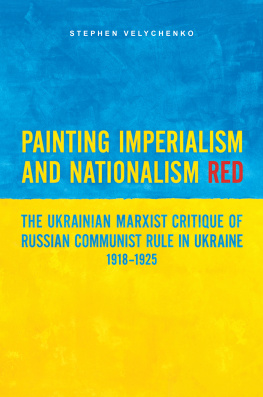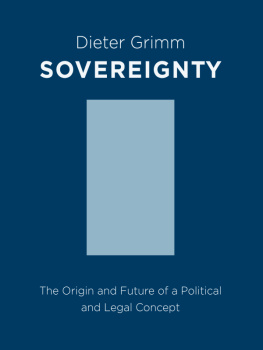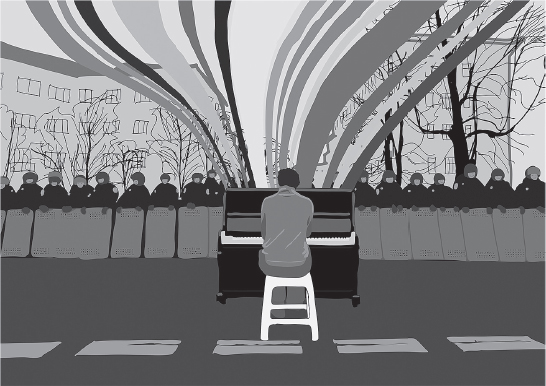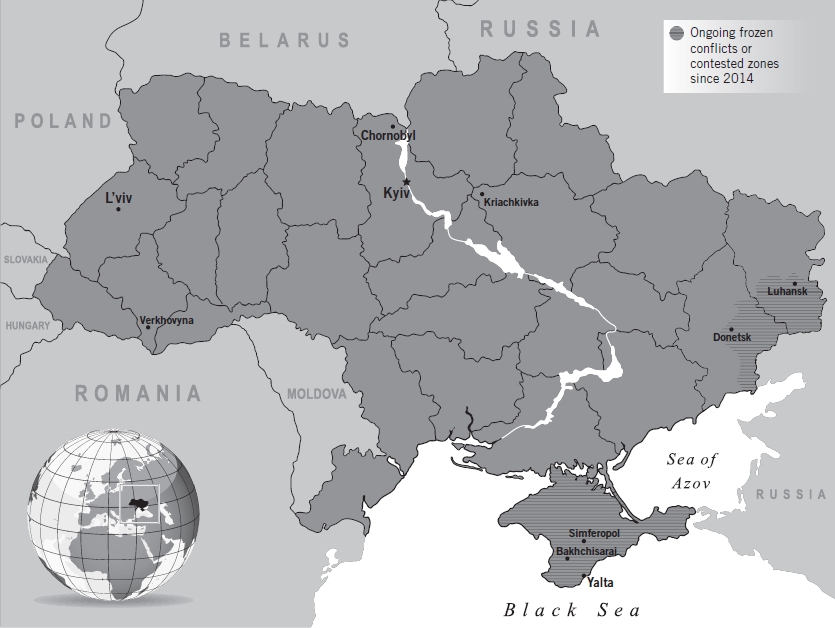
Wild Music
A pianist plays in front of the riot police during the Maidan Revolution. Copyright Eliash Strongowski after a photograph by Oleg Matsekh, 2013.
Maria Sonevytsky
WILD MUSIC
Sound and Sovereignty in Ukraine
Wesleyan University PressMiddletown, Connecticut
Wesleyan University Press
Middletown, CT 06459
www.wesleyan.edu/wespress
2019 Maria Sonevytsky
All rights reserved
Manufactured in the United States of America
Designed by Mindy Basinger Hill
Typeset in Minion Pro
Library of Congress Cataloging-in-Publication Data available upon request
Hardcover ISBN: 978-0-8195-7915-7
Paperback ISBN: 978-0-8195-7916-4
Ebook ISBN: 978-0-8195-7917-1
54321
Front cover illustration by Sashko Danylenko.
What a view from the West-North of these regions, when one day the spirit of civilization (Kultur) will visit them! The Ukraine will become a new Greece: the beautiful heaven of this people, their merry existence, their musical nature, their fruitful land, and so on, will one day awaken: out of so many little wild peoples (kleinen wilden Vlkern), as the Greeks were also once, a mannered (gesittete) nation will come to be: their borders will stretch out to the Black Sea and from there through the world. Hungary, these nations, and an area of Poland and Russia will be participants in this new civilization (Kultur); from the northwest this spirit will go over Europe, which lies in sleep, and make it subservient (dienstbar) to this spirit. This all lies ahead, and must one day happen; but how? When? Through whom?
Johann Gottfried Herder, Journal meiner Reise im Jahr 1769
, !
(Please, lets not be barbarians!)
Sign hanging in the entryway of an apartment building in Kyiv, 2011
CONTENTS
KEY SITES REFERENCED IN THIS BOOK
PREFACE
Sovereignty, a key term of this musical ethnographic study, emerges from the exigencies of Ukrainian political instability. The revolutionary upheavals of the Maidan in 20132014 called Ukrainian political sovereignty into question for the second time in a decade, disrupting the lives of many of my interlocutors and demanding that I acknowledge how much the conceptual terrain had shifted since I began my research in Ukraine in 2004. As the previously unthinkable challenges to Ukraines territorial integrity increased in 2014 with Russias opportunistic seizing of Crimea and provocations on the eastern borders, I had the opportunity, as an ethnographer, to see my own investments in the project of Ukrainian statehood come into relief. Until then, Wildnessthe other key term of this studyhad been my focus; in the first iteration of this project, I studied two borderland populations (Crimean Tatars and Hutsuls), observing how modern-day discourses of civilization and barbarism were made audible through musical practices. After the borders of contemporary Ukraine became contested in the aftermath of the Maidan, I was forced to confront the ways in which I had been taking the political sovereignty of Ukraine as an overly convenient way to bound my comparative project.
Apart from the fact that I had largely studied the musical practices of Ukrainian citizens for whom the states political sovereignty was meaningful and important, I had to reexamine the assumptions of my own politicized subject position as a child of the postwar Ukrainian-American diaspora, which carried with it a baseline belief that Ukrainian statehood was a legitimate project. (In Abu-Lughods [1991] memorable term, this split identity marks me as a halfie.) As Crimean Tatars were ordered to trade in their Ukrainian passports for Russian ones, as Hutsuls became newly caricatured by Russian media as part of a rabid neofascist takeover of Ukraine, as the Russian state vowed to defend its Russian-speaking compatriots abroad, I could no longer take the legitimacy of the state for granted. Pragmatic questions about how to continue research in certain regions led to conceptual ones, such as whether to refer to the people who were fleeing from Crimea or the conflict zones in the eastern Donbas and Luhansk regions as internally displaced persons (IDPS) or refugeesa difference in terminology that belied a larger political reality as to whether these territories of Ukraine had been, in fact, absorbed by another sovereign power.
Inspired by Madina Tlostanova and Walter Mignolos (2012) call that scholars situated in the West must strive to learn to unlearn in order to relearn, I offer this prefatory note to situate myself within this musical ethnographic study of Wildness and sovereignty, in the hope that it lays bare the continuing process of my own (re)education. I have long recognized that this term of intimacy, while endearing, risks obscuring just how different my lived experience and horizons of opportunityas a middle-class American citizen who was working toward and eventually earned a PhD at a prestigious university in New York Citywere from the limited conditions I often encountered throughout Ukraine. At the same time, my inability to pass fully as Ukrainian in many contexts made me a target of suspicion (I was accused of being a spy on a number of occasions), derision (especially for those Ukrainians who had soured on the diaspora and its interventions in Ukraines internal affairs), or hostility (when my inability to speak Russian fluentlyI was raised speaking only Ukrainian, which remains rarewas interpreted as evidence that I was a nationalist zealot who must be refusing to switch to Russian). Marked through my upbringing and affiliation with the North American Ukrainian diaspora, sanctioned by the knowledge-production frameworks of the Western academy, this book represents a reckoning with my own assumptions about what I thought Ukraine was before beginning this research.
My parents left Western Ukraine to flee westward across the bloodlands of World War II (Snyder 2010a). With their families, they spent years in displaced persons (DP) camps after 1945, before they won visas that allowed them to emigrate to North America (my mothers family to Coaldale, Alberta; my fathers to New York City).
In the summer of 1991, my family secured Soviet visas and prepared to travel to Ukraine. Leaving from Vienna on a massive, fume-filled train, we rumbled eastward on August 24, 1991, the very day that Ukraine declared its independence from the Soviet Union. At the age of ten, I could not comprehend the scale of historical events that we had stumbled into, but I remember bottles of champagne when we arrived at the train station in the Western Ukrainian city of Truskavets; my fathers tears upon reuniting with family that he had not seen since the 1940s; the grey shops with prosaic names (Milk, Bread) and bare shelves; the black market machinations my mother undertook to acquire a toothbrush; the visit to a family village where there was no running water; and the rock-bottom prices of hand-whittled souvenirs that my brother and I bought for our friends back in the United States. When we left Ukraine after that first trip, I was inconsolable as the train lurched out of the Lviv train station and all of my new uncles, aunts, and cousins waved goodbye to their American relatives. I discovered on that trip that my childhood Ukraine had been a mirage: the real place was alien, full of real people with complex and disadvantaged lives. In it, I was a strange misfit speaking an archaic dialect imprinted with privilege and distance. And yet, I wept at leaving.
Next page
